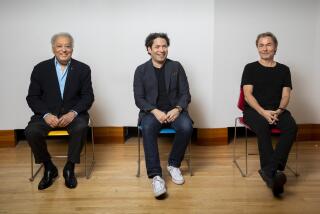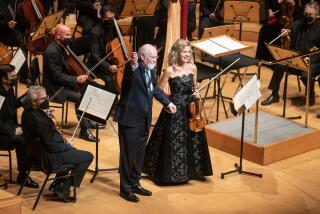Academy of West Offers Ebullient Rossini
- Share via
SANTA BARBARA — For the Music Academy of the West, a summer of festivity in celebration of its 50th anniversary reached a climax over the weekend in two performances--the first West Coast staging--of Rossini’s ebullient “Il Viaggio a Reims” (The Journey to Rheims), a minor but irresistible work first created as a piece d’occasion in 1825 for the coronation, in Rheims, of Charles X of France.
Jollity and buoyancy, the composer’s effortless accomplishments in this melodious score, enlivened the performance Friday when the authoritative Randall Behr conducted with infectious brio and a willing, if sometimes overblowing, orchestra played in high style and spirits.
The game and practiced acting of an attractive cast of young proto-professionals could not also encompass the exalted level of vocal achievement demanded in Rossini’s trap-ridden score; still, the dozen and more principals made heroic and sometimes effective stabs at that level, despite a few tell-tale squeaks and bleats that the happy opening-night audience chose to ignore.
Stage director Christopher Mattaliano, who has produced “Il Viaggio” before, kept the comedy bright and relentless--the work was, at its inception, after all, a spoof of all things operatic, as well as Rossini’s final piece in Italian (he wrote only French opera subsequently).
Thus, sillinesses in the behavior of the individual actors as well as the ensemble seem built in, just like the ubiquitous trills in every aria. The cast carried them off--the silliness, as well as the trills--well, for the most part. And all joined in the general air of madcap hilarity without self-consciousness.
As the evening progressed, the serious and dramatic sides of this rich score also came into focus in duets for the characters Corinna and Lord Sidney, sung by Monique McDonald and Randall Jakobsh, and for Marchesa Melibea and Count Libenskof, sung by Rinat Shaham and John Osborn, respectively. All four performed touchingly, artfully and credibly, making these vocal moments the high points of the performance.
The rest of the time, and having to cavort on the steeply raked stage (the minimal but handsome set was the work of Allen Moyer, with the current lighting design of Paul Brohan), the cast remained busy and steadily occupied, if never, ever, out of breath.
Along with a handsome and mellifluous chorus, the principals so engaged included Anne-Marie Seager, Nicholas Robinson, Brad Alexander, Emma Curtis, Keith Phares, Yves Saelens, Nigel Smith, Marcus DeLoach and Brian Leerhuber.
Joslin Romphe made a commanding Madame Cortese, the hostess of the inn, and Lynette Tapia deftly impersonated the florid Comtesse de Folleville, “a fashion-mad Parisian.”
After a six-year hiatus, and now with a new voice program director in the person of the redoubtable and inspiring Marilyn Horne, Music Academy of the West is back in the opera-producing business, and at the same, comfortable stand, the historic and intimate Lobero Theatre. The promise for the next 50 years is clear.
More to Read
The biggest entertainment stories
Get our big stories about Hollywood, film, television, music, arts, culture and more right in your inbox as soon as they publish.
You may occasionally receive promotional content from the Los Angeles Times.










